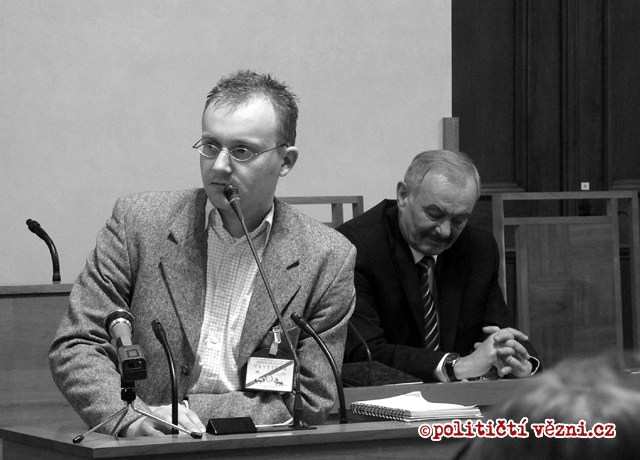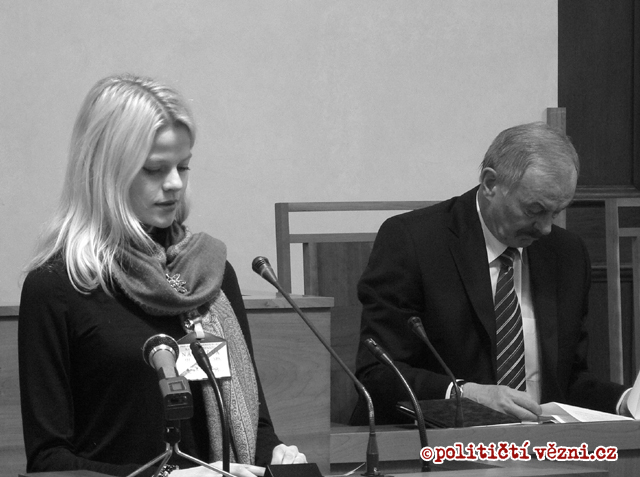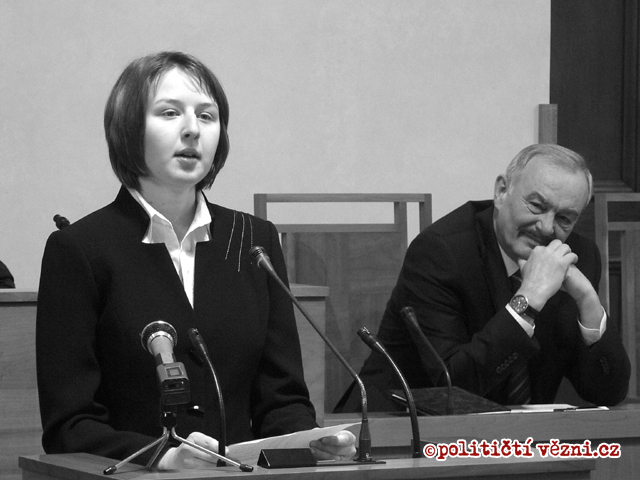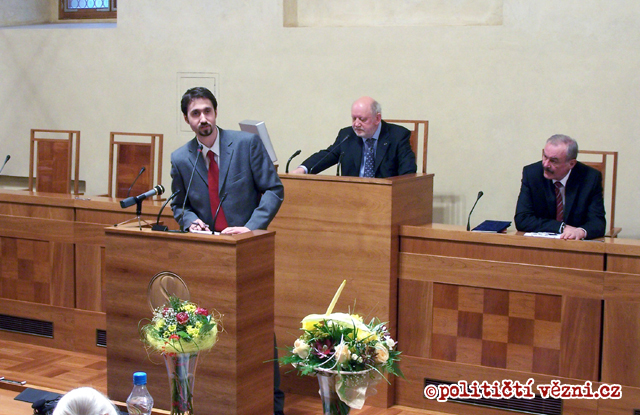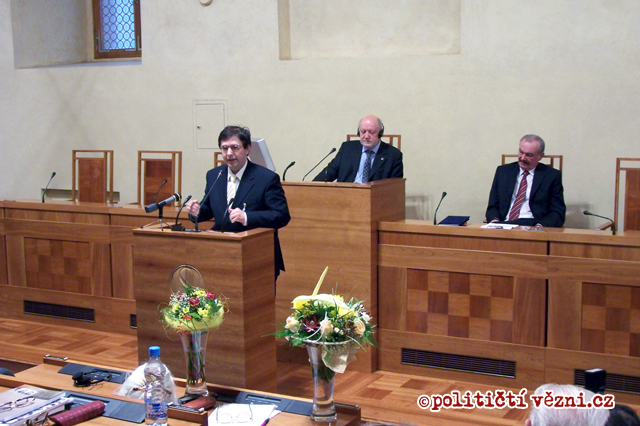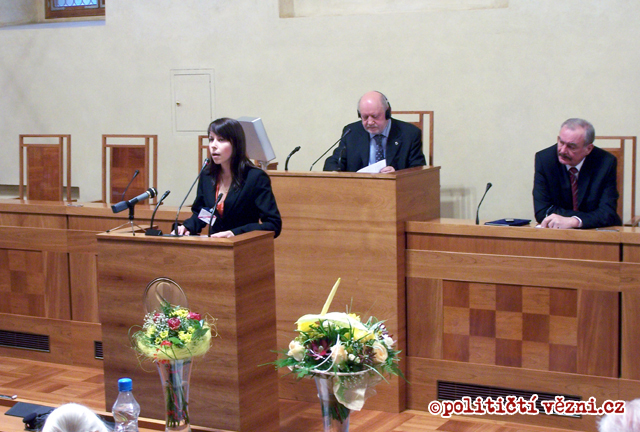Mene Tekel Conference Paper
This text was prepared during the International Conference "Victims of Stalinism in the Eyes of YOUth" by its participants who reflected about the meaning of individual stories of victims of Stalinism and the communist heritage. This reflection was presented at a parallel International Conference Mene Tekel on 24th February 2009 in the Prague Senate of the Parliament of the Czech Republic. Young authors of this text delivered their own definitions and meanings of key issues related to modern history in the countries of European Union.
Introduction - Sam Schatteman - Germany
The participants reflected about the meaning of individual victims of Stalinism and the communist heritage. First, they discussed in order to get a definition consensus about the notions I.' individual´, II. ´victim´, III. ´Stalinism´ and IV. the ´communist heritage´. Though at first sight this may seem trivial, it is of utmost importance to know what we are talking about, especially since the participants come from very different backgrounds where those notions each for each self can have a different meaning and implications. After that, the participants examined to what extent their defined words can be understood within the thinking cap of ´bonds´ - relationships. In what follows, the participants will present their findings.
Participants report
I. ´Individual´ - Nela Scholma - Germany
1. The meaning of the word ´Individual´
An independent element, but a part of a society. We speak of an individual when this person stands out from a group through extraordinary behaviour or appearance, but also when we deal with one specific person with his or her individual life story out of many. Everybody has an individual history and a personal state of mind, but is also embedded into a social network. An individual is thus a part of a society, but can and must be seen as an element apart from it´s society at the same time.
2. Relations to society
A society has been created by and consists of many individuals. A common, holistic culture has been formed by them, but has a reciprocal influence back on every single individual. People are influenced by family, education and state. The individual has a personal relationship to and within his society and among other individuals. He or she can either identify with his social identity or can be adaptive and tolerant towards other societies. This is an important difference when we deal with two individuals from two different societies: The dominance of their cultural impact will decide how their relationship shall be. The individual stands alone as a highly influence able element in a constant relation to it´s environment.
II. ´Stalinism´ - Alexey Korolestelev - Russia
1. The definition of ´Stalinism´
Stalinism is the political regime based on the Soviet model, created and lead by Joseph Stalin (1922-1953). Stalinist regimes existed throughout Eastern Europe and in Asia (China, North Korea), most of them were reformed to moderate forms soon after death of Stalin, but in some countries Stalinism could remain for decades. The other meaning of Stalinism is the way of managing a totalitarian dictatorship. Compared with Hitler and Mussolini, the regime of Stalin was created not by a charismatic popular leader, but by a non-populist pragmatic "people manager", who created and controlled (through terror) a network of loyal executives.
2. Relation to ´ Stalinism´
Despite of the changes in last decades, Stalinism and the personality of Stalin still find admirers and supporters. The number of such people is very small, but they are present in all countries and age groups. One group is older people, feeling nostalgic about "good old Stalin times". The second group is the "etatists" - people of different age, considering Stalin as a perfect leader and crisis manager for a country, despite the terror. And the youngest group is young leftist extremist, wanting to be "different" from the "normal" boring politics. All those groups have often lack of knowledge of real Stalinist regime and feel attracted by an idealistic image of Stalin.
The acceptance of Stalinist regimes in different countries can also be referred to the mentality and historic traditions in certain countries. When some peoples could only be forced to accept a Stalinist model, and used the next opportunity to get rid of it (Hungary, Poland, Czechoslovakia), other peoples got used to follow a national leader (Russia, China). In some countries (Cuba) such organized society can hardly be introduced at all because of mentality of their people.
III. ´Victim´ - Eva Palivodová - Czech Republic
I would like to introduce you a short conclusion of the discussion of my group. The topic was the meaning of the word "victim". We tried to define what it means to be a victim and to find the bonds and relationships connected with the meaning of "victim".
1. The definition of the term ´victim´
We suppose victim is somebody who had to bear some pain or violence, but who did not commit anything wrong. This topic is connected with the question of innocence and especially justice or injustice. There are some important conditions: When there is a victim, there has to exist a perpetrator. Then there is the act or the absence of the act. For example somebody is robbed - it is the act of violence. But somebody could be also a victim of passivity of the people. For example there is an injured person as a result of the car accident and nobody helps him. Another step is the recognition that is to say me or somebody else became a victim. It is often connected with the feeling of deprivation of the victim.
We think the environment (like culture, historical frame, social and political situation) has a great influence on the recognition and decision who is the victim and who is the perpetrator. For example nowadays we consider Milada Horakova a victim of the perpetrator - communist regime and state. But in the 1950s a lot of people in Czechoslovakia regarded her as a criminal.
So there are two important circumstances in the recognition of the victims: the society with its normative frame and the perception what the justice is.
2. Bonds connected with the meaning of the ´victim´
Then we discovered two main bonds connected with the meaning of the victim. First there is the relationship between the victim and the perpetrator - forgiving, hatred, forgetting, psychological trauma...
Another important relationship arose between the society and the victims. We suppose there are three main steps: 1) act 2) recognition 3) and something we called "de-victimization" - it means coping with the situation, punishing the perpetrators and some form of the compensation and rehabilitation of the victims. The third step is the most difficult and it has not been done completely yet.
IV. ´Communist Heritage´ - Birgit Oidram - Estonia
1. ´Communist Heritage´
In our group we focused on the concept of the communist heritage. In order to form a definition of that concept, we concentrated on the outcomes of the communism and agreed on the keywords that in our opinion charactarise it the best. Thus, the communist heritage can be defined with words indifference, unaccountability, laziness, unemployment, architecture, social security.
It would be important to clarify these words in detail as well. Throughout the communist era there was no freedom of expression, the core of the communist ideology was about equality - "from everybody according to their abilities to everybody according to their need". It did not matter how much anybody contributed, wanted to achieve or worked, in the eyes of the authority the normal people (not those of power-holders) were still treated equally and big efforts did not lead anywhere. Since it was impossible for people to make a difference in the society, they became indifferent, unaccountable and lazy, because they did not see any reason, why they should work harder or make any efforts, if it was not appreciated and further more, if the other people did not give the same contribution.
In our group, we also pointed out the keyword "unemployment", since after the collapse of the communist block the economy had to be restructured and rebuilt again and unfortunately many people did not meet the needs of new circumstances, neither were they able to through new vocational training. That brought about huge unemployment, which results one had to deal with in several countries throughout 1990s (Eastern Germany, Baltic States).
We all have the pictures in our minds when we think of the communist architecture. Communist era left us many huge block-building areas in most of the cities of the Central-Eastern Europe that we do not like nowadays.
Last keyword that we agreed on as a characteristic of the communist system is the social security. This can be considered as a positive outcome, because all public services were provided to the citizens for free, i.e. health care, education. In the capitalist countries these days we have to pay for these services to some extent.
2. Relations between people in light of communist heritage
Dealing with the relations between people, we took a look at three different periods of time.
- 1) Communist era - the collective sense was much stronger between people than ever later. In a difficult time, people had to stick together and help each other any how they could. As everybody was equal, there were no reasons to envy the others or to be greedy.
- 2) During the time of the collapse of the communist block - the society was divided into two parts,
- a) people, who were at the right time at the right place, received high managerial positions and could privatize several properties,
- b) people, who were not at the right time at the right place and who had to start from the very first beginning.
- 3) After the collapse of the communist block - people became individualistic and more hard-working, especially the younger generation, because from then on everything was up to them and the results were the greater, the more they worked on them.
Conclusion - Sam Schatteman - Germany
Throughout the discussions, participants found out the difficultness of finding a consensus about an at first sight easy way of defining words. It became clear that history in Europe is a summation of very different layers of understanding and events that happened. It was shown that we cannot run away from history and should acknowledge what happened in to the past. We are knit in bonds with previous generations. Our willingness and success in dealing with Europe´s often very difficult history will deeply impact what we will pass on to our children and them to their children. It is our responsibility to recognise these bonds to the past as well as those to the future. With our workshop we found our starting point.

